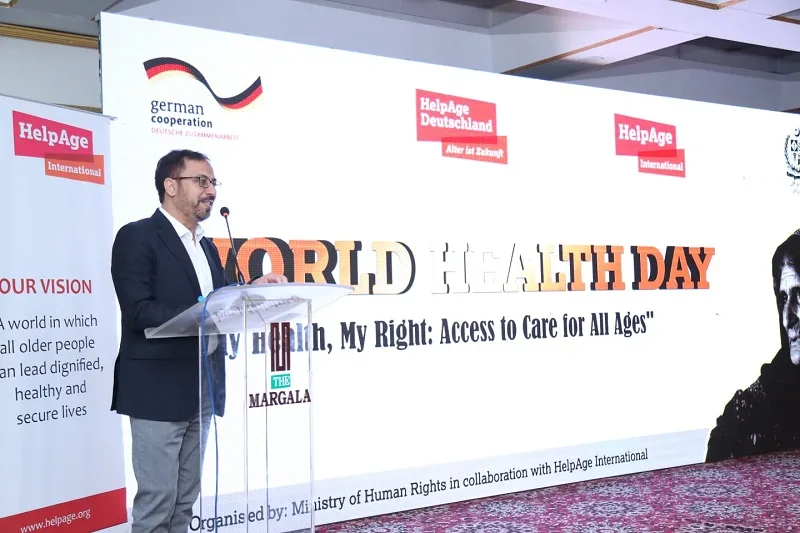ISLAMABAD, Pakistan: The HelpAge International has organized stakeholder dialogue on World Health Day to mull over suggestions to improve and guide policy endeavours to facilitate the elderly population of the Country facing health, decent life style and living conditions crises.
The HelpAge under the patronage of the German Federal Ministry for Economic Cooperation (BMZ) is working to improve the prevailing legal landscape for elderly population in Pakistan and is engaged in various research, data collection and policy making initiatives pertaining to the ageing population of the country.
Speaking on the occasion, Moez-Ud-Din Kakakhel, Country Director, HelpAge International said the ageing population of the Country comprised 7% of the total 240 million Pakistanis. He said the senior citizens are facing health and livelihood challenges as both are intertwined and as a matter of fact only 3% of the total elderly population had pensions as source of income while the rest lacked any livelihood opportunity to survive on their own.
Moez-Ud-Din Kakakhel opined that the forum would engage experts, practitioners, policy makers and members of the elderly from the civil society to gather ground-based recommendations that would be shared with the policy makers in the form of a report to establish baseline for well-informed policy initiatives.
Professor Dr. Shahjee Ahmed Siddiqui from the Pakistan Institute of Medical Sciences (PIMS) said population ageing is growing at an unprecedented rate in the Asia and Pacific regions due to rapidly decreasing fertility rates, and declined mortality ratio.
Dr. Shahjee Ahmed said the current number of elderly people in Pakistan is 11.3 million that will increase upto 43.3 million by 2050. He added that the major problems faced by elderly in the country or society at large are changes in mobility and independence, financial constraints, end of life care whereas there is an increased need for the preventative care of the elderly.
Dr. Sophia Younas, Deputy Director General, Ministry of National Health, Services, Regulations, and Coordination said the dialogue will help engage with the elderly and civil society representatives including the donors and development partners to gauge the ground pulse for specific and targeted policy endeavours.
Dr. Sophia said the policy initiatives in the past were mostly haphazard, and less effective due to lack of feedback from relevant stakeholders.
However, it should be all inclusive and more focused on relevant stakeholders to get exact and well-guided feedback, she added.
Dr. Sophia said the hospitals have started establishing special ramps, and provision of wheelchairs for the elderly, whereas after the devastating floods the reconstruction of healthcare infrastructure is being built climate resilient and elderly friendly to ensure inclusivity.
The Deputy Director General welcomed all sorts of feedback and suggestion at the Ministry’s platform to engage with elderly population for better policy making process.
Dr. Arshad Qaimkhani, CEO Sehat Sahulat Card Programme, said Sehat Sahulat Card Program is the program for all age in all provinces and capital city except Sindh Province.
Mr. Tom Manuel Kafczyk, Head of Programs at HelpAge Germany said, I am very impressed for the steps taken by the government of Pakistan for Older People in policy level and implementation and especially in health sector. He went on to note that even in Germany, older people do not have access to the same facilities.
Mr. Arif Shameem, Director General, Social Welfare Department, Ministry of Human Rights empahised the importance of data which helps to design the projects and ministry’s’ initiatives, in addition, He said our constitution is already inclusive which protects the rights of older people.
The Chief Guest Ms. Huma Akthar Chugtai, Member National Assembly briefly commented on the presentations and speeches.
Ms. Huma Akthar Chugtai talked specifically about Older People with Disabilities in her speech.
In addition, she also offered her voluntary services in for any legal discussions and amendments at policy level.
